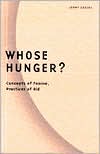

 |

|

The average rating for Whose Hunger?: Concepts of Famine, Practices of Aid based on 2 reviews is 4.5 stars.
Review # 1 was written on 2009-01-11 00:00:00 Michael Perlman Michael PerlmanGlobal food insecurity has garnered plenty of media attention within the last few months as food prices continue to skyrocket. The recent crop of hunger-related articles have portrayed the cause of this problem in terms of drought, blight, flooding, effects of war, and the increasing use of farmland to produce biofuel depending on whether the crisis is happening in Afghanistan, Sudan, Somalia, or any other number of countries currently facing a food crisis. The solution, of course, is to call for international humanitarian aid. Before reading Jenny Edkins' Whose Hunger?, I probably wouldn't have noticed the way that hunger is routinely depoliticized in mainstream discourse. Published in 2000, this work continues to be relevant, offering a seldom heard critique of the way that systems of international aid and concepts of famine are produced and reproduced. Whose Hunger? is a thought-provoking postmodern critique not only of international practices of humanitarian aid in response to famine, but to modernity as a whole. Edkins draws attention to the ways in which the concept of famine has been depoliticized and constructed as a technical problem that can be investigated and solved by so-called experts using the scientific method. Edkins offers a scathing indictment, deconstructing mainstream discourse on famine and aid as a "product of power relations" in which powerful, benevolent, wealthy, first world "experts" and powerless, uneducated beneficiaries in the "underdeveloped Third World" subjects are produced and reproduced. This is a very academic read that relies heavily on the work of Foucault, Derrida, Zizek, Lacan, and other critical and postmodern theorists. For a reader unfamiliar with this theory, Whose Hunger? is likely to be a challenging read, in spite of the background information Edkins provides. If you are like me and love a good dose of deconstructive analysis, you are in for a treat. Although there are points where Whose Hunger? is in danger of becoming overly theoretical, Edkins brings the work back down to reality and makes it more understandable by providing examples from her own original research on food for work programs during the Eritrean famine in the mid-1990s. One of the most fascinating (and sadly short) aspects of Edkins work is her discussion of media images of famine victims and the consumption of these images as a kind of voyeurism akin to the consumption of pornography. She also makes brief mention of the common use of women's bodies in such imagery, specifically the emaciated woman with the child she cannot feed at her breast. I wish she would have delved into the dissection of images more thoroughly. A reading of Whose Hunger? would benefit NGOs worldwide and international aid workers above all else by providing a critical perspective of work that is usually taken for granted as inherently good. The book whet my interest in taking an alternative look at the way in which NGOs, nonprofits, and aid agencies contribute to the reproduction of power relations rather than challenging them. Review by Liz Simmons |
Review # 2 was written on 2007-08-04 00:00:00 Charles Hart Charles Hartwe should learn this stuff in elementary school. |
CAN'T FIND WHAT YOU'RE LOOKING FOR? CLICK HERE!!!